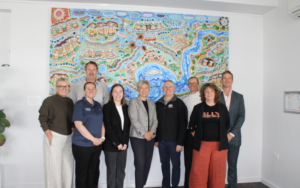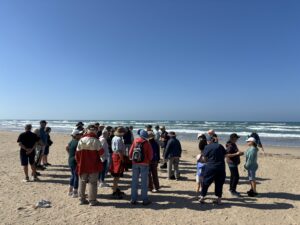We sat down with Dr Ben Van den Akker, Enterprise Fellow within STEM from UniSA and Management Board member for the Goyder Institute to hear his thoughts on the academic and industry interface in research and his passion for wastewater treatment plants and water reclamation schemes.
What is your main research focus and what first sparked your interest in this area? My interest lies in applied microbiology with a focus on enhancing the performance and sustainability of wastewater treatment systems. This includes exploring ways to monitor and reduce greenhouse gas emissions, investigate new biological treatment processes that can improve energy efficiency, and maximising opportunities to recover resources from waste. I also have an interest in the health aspects of water quality, which encompasses the use of microbial risk assessment to enhance the safety of water recycling schemes. Much of my research has required the effective integration of microbiology with chemistry and applied engineering, and hence the collaborative and multidisciplinary aspects were what sparked my interest in this area.
What do you think are the biggest challenges facing wastewater treatment plants and water reclamation schemes in SA? One of the biggest challenges facing wastewater treatment plants is how best to manage ageing infrastructure to cater to population growth, while also meeting the growing need to improve the sustainability of these systems to achieve net-zero carbon emissions and circular economy objectives. With regards to recycled water, the economic viability of water reuse schemes is a big challenge that can restrict the expansion of water recycling throughout Australia. Ultimately this is because understanding market demand, particularly by agriculture, is difficult due to heterogeneity in farmer needs. However, this presents an opportunity to better understand the different preferences of farmers and the barriers they face with adopting recycled water, which can assist water providers in developing targeted strategies to foster higher uptake.

What is are the benefits of collaborations between academia and industry? Academics benefit greatly from partnering with industry. Researchers gain a real-world appreciation of industry priorities and challenges, as well as valuable practical insights that are needed to implement research outcomes. From a personal perspective, one key benefit I experienced as a scientist embedded in industry was the ability to learn from others such as plant operators, asset managers, regulators and engineers who bring diverse expertise and practical perspectives. It was also incredibly rewarding to witness the practical application of our research deliver tangible benefits.
Is there a really interesting piece if research you’ve recently read or been involved in? I am particularly fond of collaborative research I was involved with that developed an approach to accurately quantify fugitive greenhouse gas emissions from wastewater treatment plants. The outcomes of this work not only contributed to the development of new knowledge, resulting in numerous high-impact publications that later informed international guidelines on emissions reporting, but also resulted in the application of research outcomes that benefited the wastewater treatment plant. This served as a nice example of researchers collaborating closely with industry to deliver outcomes that benefited all.
How do you think knowledge creation and research can create greatest impact to inform decision making? The creation of new knowledge through research is fundamental as it establishes the evidence base necessary to ensure decisions are made based on rigorous and objective evidence. In my area of work, decision making often involves the need to explore trade-offs between environmental, economic, social, and technical aspects and therefore knowledge on all these dimensions is essential to make informed and balanced decisions, and further highlights the importance of multidisciplinary collaboration
Is there a fact do you wish more people knew about water? An interesting fact about sewage is that it contains a lot of valuable resources, including energy, nutrients, and water. As we transition to a circular economy, wastewater treatment plants can offer the potential for turning what was once seen solely as a disposal problem into a valuable resources for utilities, agriculture, and communities.



